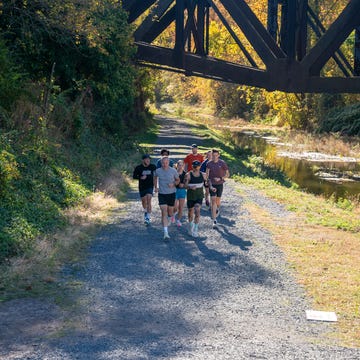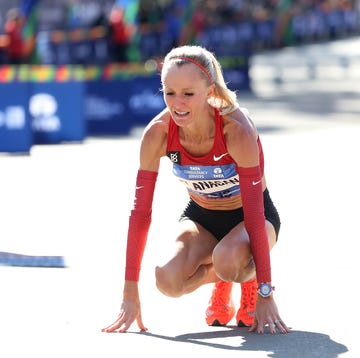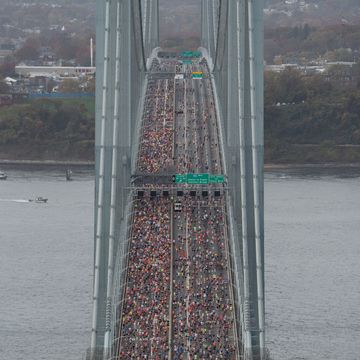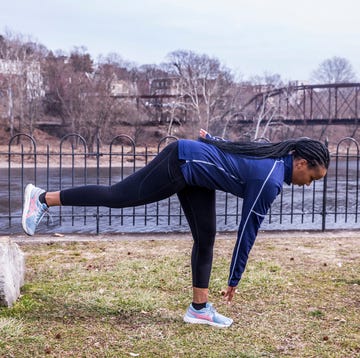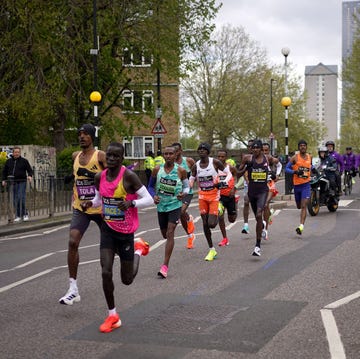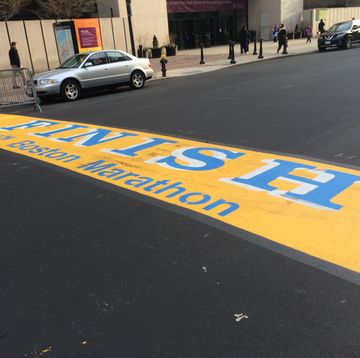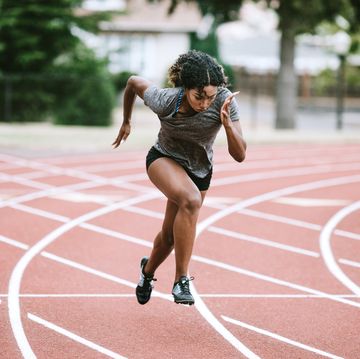Twelve years after David Olds finished second behind Eddy Hellebuyck in the men’s masters division (age 40 and over) of the 2002 USA Winter Cross Country Championships—and four years after Hellebuyck admitted in a Runner’s World interview that he’d doped prior to the event—USATF belatedly awarded Olds the gold medal for the race. The presentation was made during Saturday’s awards ceremony for the 2014 USA Cross Country Championships in Boulder, Colo. And it came as a complete surprise to Olds.
“I had heard that the USATF was going to change the results,” said Olds, who struggled with sciatica during Saturday’s masters race, finishing seventh overall in the men’s 50–54 age group, “but I didn’t realize they were giving me a medal. To have it actually announced and presented, it was kind of cool. I was touched.”
Speaking for the USATF, Bill Quinlisk, the masters representative on the Cross Country Running Council, said, “This isn’t about catching somebody who doped. It’s about honoring the person who deserves the award. David Olds, in our minds, is the real winner of that race. We’re a little late in honoring him, but at least we’re able to set this one right.”
The 2002 6K men’s masters cross country championship was held on a sunny, 42 degree day in Fort Vancouver, Wash., over a course that included rolling hills, thick grass and slick, muddy sections. For the masters race, 134 athletes toed the line, but Hellebuyck quickly separated himself from the field, trailed by a chase pack that included Olds, defending champion Tim Minor, and Sean Evans. Over the next two miles, the chase pack would slowly spread out. At the finish, none of the top five runners were within 5 seconds of one another.
“Eddy just took off,” said Minor, who finished third. “Dave and I had a really good race going on, but we knew we were basically running for second.”
Hellebuyck would later test positive for using EPO (erythropoietin). Still, Olds hasn’t dwelled on the loss. “I wouldn’t say I’ve obsessed about it, but when I learned that Hellebuyck had been busted for EPO and that his results were going to be invalidated, I thought about it a little. Of course, I was pretty confident that Eddy wasn’t going to send me a check [for the first place prize money].”
Instead, Olds put the loss behind him and recommitted himself to training. Later in 2002, he would win the masters race at the USATF 10K Club Cross Country Championships, and he would follow that by claiming the overall title in the masters division of the 2003 USA Cross Country Championships. Over the next decade, his masters squads (Team Runners High and, later, the Fluffy Bunny Track Club) would win 10 national masters team championships in the Men’s 40¬–49 division.
As for Hellebuyck, he was already the target of drug rumors by 2002. After becoming an American citizen in 1999, Hellebuyck had dominated both open and masters road racing with a prolific race schedule that sometimes included two races on the same weekend, a feat beyond the capability of most older runners—or younger ones. In 2003, Hellebuyck posted a jaw-dropping five week period of racing in which he recorded three American masters road race records—14:13 for 5K, 29:08 for 10K and 2:12:46 for the marathon—and a near-record 1:05:12 for the half marathon. Invited to the Olympic Training Center in Chula Vista, Calif., Hellebuyck failed his first test there, earning a two-year performance ban and effectively ending his running career.
The genesis for Saturday’s award ceremony was a discussion among Olds’ current teammates on the Cal Coast Track Club (which, in the interest of full disclosure, includes the author of this article). While preparing for the club’s participation in Saturday’s race, the discussion turned to the 2002 race—and the injustice of Olds being denied his moment in the sun. Members of the club reached out to USATF about awarding Olds a belated gold medal.
“I ran it by my committee,” said Quinlisk, detailing his reaction to the Cal Coast query, “and the response was unanimous, with everyone saying, ‘Well, of course, what a great idea!’ The problem was recreating the history—chasing down the data, then chasing down all the people involved. It’s not something that Masters has had to deal with before.”
What followed was a whirlwind effort by USATF officials. Don Lein, the masters LDR chair, determined that the race occurred during a period when Hellebuyck admitted to taking drugs. USATF corporate counsel Norman Wain advised that Hellebuyck’s win could be vacated under a USADA order covering Hellebuyck’s competitions from late 2001 through early 2004. Michael Scott, chair of the USATF Cross Country Council, acting on behalf of the Council, approved the proposal. And Veronica Rodriguez, the USATF events coordinator, ordered an engraved gold medal for Olds, to be presented during Saturday’s masters awards ceremony.
“I think it’s fantastic,” said Minor. “A bunch of the [guys] are going to be thrilled to know that justice was finally served.”
Evans, the fourth place finisher in the 2002 race, agreed with Minor. “If Hellebuyck was juicing, then he’s gotta go. If the rest of us are racing clean, we all have to race clean.” Evans also had one more suggestion for correcting the injustice of that day. “David needs to send Tim his medal, and Tim needs to send his to me. That way I get a medal!”
Both Olds and Minor have agreed to put their medals in the mail.
Olds’ struggles on Saturday only reinforce USATF’s decision to honor him for the 2002 race. For masters runners, who suffer an elevated injury rate coupled with the natural slowdown that comes with age, time at the top is often short. While age group competition remains fierce for decades, overall titles rarely occur outside a brief window in masters competitors’ early 40s. With Hellebuyck’s record expunged, Olds can lay claim to being the top masters cross country runner in 2002 and 2003.
“Now I’m officially a three-time national cross country champion,” said Olds, “and that’s pretty cool.”
Twelve years after a drug cheat tried to steal a championship, USATF corrected the record. Olds was the best runner in the race on that chilly day in February, 2002. And now he’s got the gold medal—and the memory of Saturday’s ceremony—to prove it.


